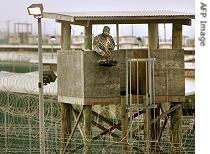2007年VOA标准英语-Guantanamo Anniversary Rekindles Controversy(在线收听)
By Al Pessin
Pentagon
10 January 2007
This week marks the fifth anniversary of the detention center for terrorism suspects at the U.S. naval base at Guantanamo Bay, Cuba. The anniversary is rekindling the debate over the facility, with human rights groups holding demonstrations to call for the center to be closed and the U.S. government defending its policies at the facility. VOA Pentagon Correspondent Al Pessin reports.
 |
| US guard at the military-run Camp Delta prison in Guantanamo Bay US Naval Base |
But the September 11 attacks in 2001 began a series of events that would bring a new role to Guantanamo, a role that would make its name world famous, and notorious to many, including human-rights activist Jumana Moussa of Amnesty International.
"The totality of the conditions at Guantanamo amount to cruel, inhuman, degrading treatment," said Jumana Moussa.
There have been allegations of mistreatment of detainees at Guantanamo, but fewer in recent years, and U.S. officials say investigations have shown the charges to be false. Officials say they have worked hard to improve living conditions at Guantanamo, and have opened the facility to thousands of visits by reporters, members of congress, and international activists. A U.S. law passed last year requires adherence to the Geneva Conventions.
The commander of the detention center is Rear Admiral Harry Harris.
"We are detaining enemies of our nation, terrorists, who were captured on the battlefield or running from the battlefield or providing material support to terrorism," said Admiral Harris. "We are detaining these folks legally, ethically, humanely and, importantly, we are detaining them transparently."
Jumana Moussa of Amnesty International acknowledges that living conditions at Guantanamo have improved in recent years, but she objects to the open-ended nature of the detention.
"At this point, after five years, going into the sixth year of indefinite detention, if people are not going to be charged and given fair trials, they need to be released," she said.
U.S. officials disagree. Cully Stimson is the assistant secretary of defense for detainee affairs.
"Under the law of war, we are entitled to hold our enemy, as any country is, throughout the duration of the conflict," said Cully Stimson.
U.S. officials say unlike a civilian prison, Guantanamo is not designed for punishment or rehabilitation. Rather, they say, its purpose is to keep the enemy combatants from attacking the United States again, and to glean whatever information they can provide.
"What is not allowed, and what is not proper, is for us to magically, mysteriously create out of nothing a right to a trial," he said. "For instance, 'Try them or let them free,' the mantra you hear from the left, when we do not know when the end of the conflict is."
But Stimson says the United States has not only released about 380 detainees from Guantanamo, it is planning to begin military trials for at least some of the 395 from dozens of countries who remain there. The trials will follow a new procedure approved by the Congress last year after the Supreme Court declared the old plan unconstitutional.
The man in charge of the upcoming trials is Brigadier General Thomas Hemingway.
"If the system is allowed to operate, unhindered, it will demonstrate to everybody that it is just as fair a process as you are going to find," said General Hemingway.
Human-rights advocates are not convinced. Jumana Moussa at Amnesty International says the whole system is flawed because defendants will not have sufficient rights in the military trials, and she says that is a problem for the detainees and for the U.S. government.
"If some of the folks who are at Guantanamo are responsible for the things they are alleged to or accused of being involved in, they certainly should be tried," insisted Jumana Moussa. "They need to be held accountable. But it is even more important that they be held accountable in a fair trial whose verdict cannot be questioned."
U.S. officials say the trial procedures will be published next week and they will provide defendants nearly the same rights that U.S. soldiers have in military trials. And General Hemingway believes the system will achieve the standard Jumana Moussa called for.
"With the procedures that the United States congress has established now, working with the administration, we clearly have procedures that are subject to that kind of scrutiny, and can withstand that kind of scrutiny," he said.
Scrutiny is one thing Guantanamo has not lacked, and is not likely to lack in the coming years. U.S. military officials say they will continue to operate the Guantanamo detention center for as long as the government needs it. But whether it will have a 10th anniversary, and if so with how many detainees under what status, no one can say.